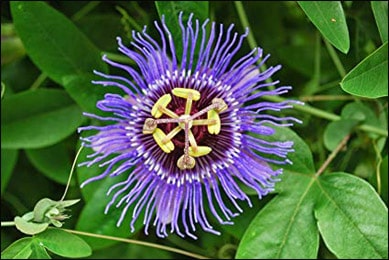
What is Purple passionflower (Passiflora Incarnata)?
Passiflora Incarnata is also known by name Purple passionflower that grows throughout the world. The aerial part of the flower has been used since long for the treatment of various health issues. It helps to treat various body ailments such as cancer, chronic pain, cough, stress, nerve pain, sciatica, skin inflammation, hemorrhoids, fungal infection, burns, menopausal symptoms, and gastrointestinal infection.
The plant is grown throughout South America and some parts of Southern United State. The plant comes under the Passiflora genus. The plant is native to the tropical and subtropical regions of the America. The flower of Passiflora Incarnata contains 5 petal, sepals, and stamens, 3 stigmas and a filament. The flowers are purple in color. The fruits of the plant are egg-shaped and contain pulpy consistency and have many seeds. The leaves are alternate and 6-15 cm long. The some of common names of the herb are passionflower, passion fruit, water lemon, wild passionflower (P. incarnatus), Maypop, apricot vine, Jamaican honeysuckle (P. laurifolia), Herba passiflorae, “maracuja” (Brazil), granadilla (species with edible fruit), and Maracuva (Peru). In Europe, people have used Passiflora Incarnata to get relief from agitation and restless. Most of the people use this as a natural herbal remedy for anxiety, stress and to calm their mind. Many people apply Purple passionflower paste directly on the skin to treat burns, inflammation, and hemorrhoids.
The early research has been shown that passionflower increases the level of Gamma-aminobutyric acid (GABA), a neurotransmitter in the brain which helps to reduce the stress. There are a number of the clinical trials has been done on Purple passionflower which shows that this natural ingredient helps to protect the body from various ailments.
Classification of Purple passionflower
- Kingdom: Plantae
- Subkingdom: Tracheobionta
- Superdivision: Spermatophyta
- Division: Magnoliophyta
- Class: Magnoliopsida
- Subclass: Dileniidae
- Order: Violales
- Family: Passifloraceae
- Genus: Passiflora
- Species: Passiflora Incarnata
Active compounds of Purple passionflower
Passionflower contains the variety of active compounds such as alkaloids, such as harmine, which is a beta-carboline alkaloid and has been known to show the variety of pharmacological effects. Such as reducing anxiety, stress, relax blood vessels, support bone health and improve insulin sensitivity. The passion also contains flavonoids such as orientin, apigenin, swertiamarin, quercetin, kaempferol, vitexin, and chrysin. All of them have great neuroprotective activity.
Therapeutic Uses of Purple passionflower
- Some researcher shows that passion flower is one of best natural treatment for anxiety problems. By taking passion flower can reduce the level of anxiety in your brain.
- The herbal tea of Purple passionflower is a natural remedy for the insomnia that is a sleeping disorder in many people. It can improve the quality of your sleep and maintain the sleep irregularities. The herb soothes the nervous system and reduces tension. GABA is a neurotransmitter which is directly responsible for a mood swings. The clinical trial shows that passionflower has a sedative effect which increases the level of GABA in the brain and calms your mind.
- The Purple passionflower also helps to reduce the menopausal symptoms such as hot flashes, night sweat, anger, depression, and insomnia. Along with another herb such as valerian, licorice, black cohosh, and red clover passionflower helps to reduce or even eliminates the effect of hot flashes.
- Passionflower also decreases the fluid buildup, inflammation and chronic pain due to the presence of anti-inflammatory and antioxidant compounds such as kaempferol, vitexin, isovitexin, quercetin, rutin, apigenin, and luteolin glycosides.
- Passionflower also shows some positive effect on Attention deficit hyperactivity disorder (ADHA), it is a most common mental disorder of children and teens. Children with this disorder are unable to control their impulse and may be hyperactive. So Purple passionflower due to its great nervous control ability helps to ease the symptoms of ADHA syndrome in children.
- The Purple passionflower also helps to lower the blood pressure and also removing the toxins from the body. By doing so it also protects your heart. Along with this property, the herb also reduces or decrease the insulin resistant in those with type -2 diabetes.
- Further research shows that passion flower could also help to promote respiratory health, digestive health, balance blood sugar level and also increase the absorption of some medicines.
- The herb is also effective for the treatment of a psychiatric disorder such as adjustment disorder with anxious mood.
- The herb also reduces the anxiety before surgery and might work as good as drugs for pre-operative anxiety such as melatonin or midazolam.
Side Effects of Purple passionflower
When used in a recommended amount, then it shows no side effect on your health. But the herb shows some adverse effect when you have taken it in excessive amount. The herb may cause dizziness and confusion.
Must avoided by a pregnant and breastfeeding lady.
Passionflower might cause sleepiness and drowsiness and also increase the effect of anesthesia and other medicines on the brain.
Passionflower is the best natural remedy for anxiety, stress, depression and other brain disorders. It’s a potent natural herb and has been used in Ayurveda from many years.
